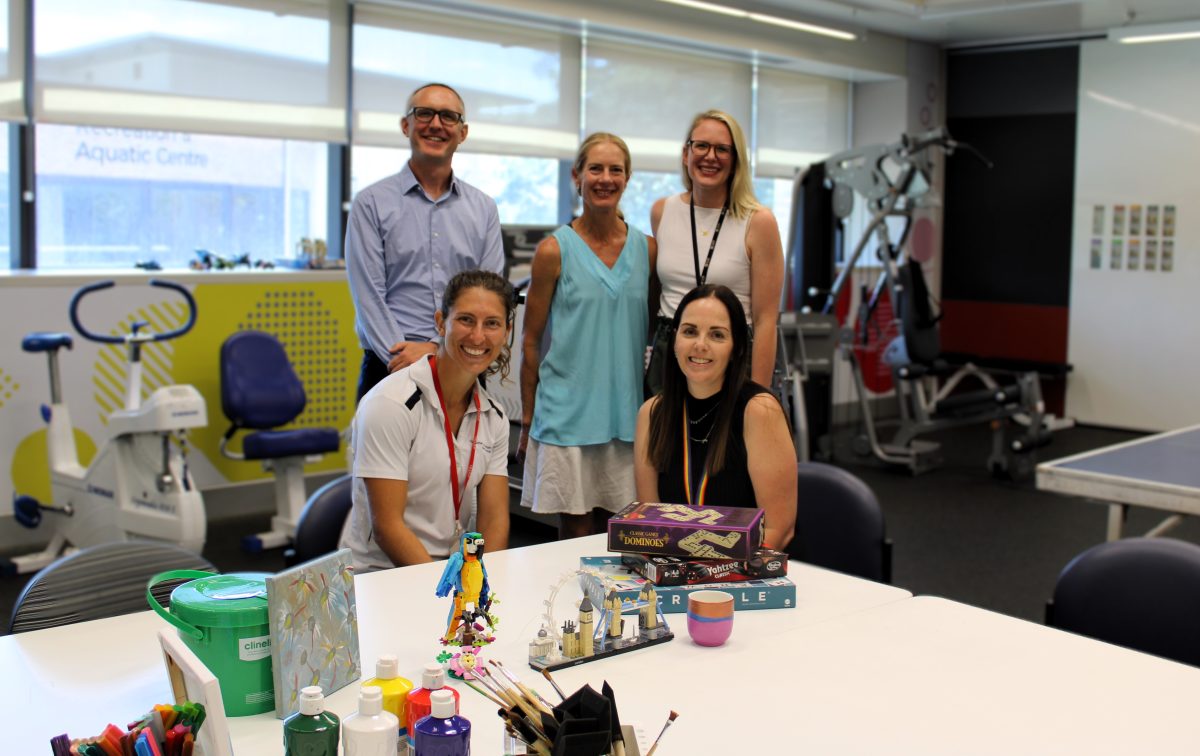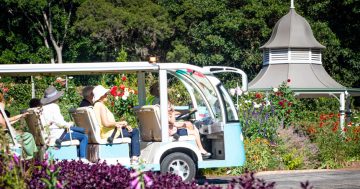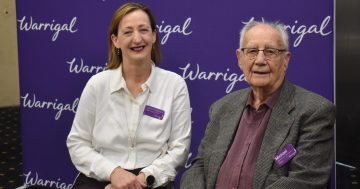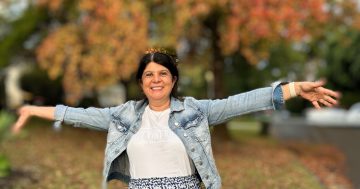
Enhance Memory Clinic team members (back row, from left): Luke Molloy, Rebekkah Middleton and Amy Montgomery; (front) Susie Seitaridis (left) and Kelly Marriott-Statham. Photo: Keeli Royle.
A free Illawarra clinic has given people diagnosed with dementia and their carers hope of improved quality of life through a holistic and humanising approach to cognitive treatment.
Enhance Memory Clinic was created by a team of nursing professionals from the University of Wollongong in 2022 after Dr Amy Montgomery wanted to explore different models of care for improving outcomes of patients after they receive the life-changing diagnosis.
“It’s a post-diagnostic clinic for people living with dementia, but it gives them activities which we describe under the umbrella term as cognitive stimulation to help keep some of the neural pathways alive,” Dr Montgomery said.
During sessions throughout an eight-week program, participants join in non-traditional targeted therapies, including art, puzzles and table tennis, with some projects being completed in a matter of hours or continuously worked on for weeks at a time.
“Things like Lego really help with problem solving, following instructions, pattern recognition, shape recognition, visual and spatial things, so it is a fun activity but it’s also still keeping some of those neural pathways in the brain alive,” Dr Montgomery said.
Registered nurse Dr Kelly Marriott-Statham said the benefits went beyond the specific activities.
“We found, as the clinic has evolved, that social connection and that sense of belonging is really important to the participants and to the carers as well,” she said. “Because they feel like they have a place that they can come to, be themselves, be accepted for who they are, they don’t have to apologise for anything and we know them and understand them.”
The clinic also has an exercise physiologist who runs individual and group sessions catered to participants’ needs.
“The exercise component matched with the cognitive stimulation just helps to maintain that wellbeing,” Dr Montgomery said.
“It ranges from low to medium-intensity exercises and using the weights to hand weights to body weights to cardiovascular exercises.”
The team is still conducting research on the outcomes of these therapies, which can be difficult due to the complex nature of dementia, but has already witnessed positive results firsthand.
“We’ve seen people’s sense of self-worth increase, and I guess that has impacts on their overall wellbeing and how they are interacting with the people they love at home,” Dr Marriott-Statham said.
Dr Montgomery added: “Normally you would see someone’s cognitive scores decline over an extended period of time and we’ve been able to maintain those scores.
“What that sometimes means in their everyday life is not so clear cut because dementia presents so differently in each and every person, it’s sometimes quite hard to get that quantitative data to show what we’re doing here.”
And it is not only the participants seeing the benefit.
Nursing students have received valuable learning experiences by being able to see past the diagnosis and reduce the stigma around the disease.
Carers have also been supported, with Associate Professor Rebekkah Middleton running yoga and Associate Professor Luke Molloy facilitating support sessions.
“The way that the clinic is run for people with dementia is amazing but, for me, equally it’s for carers as well and that’s who I mostly have interactions with at yoga,” Associate Professor Middleton said.
“There’s lots of stories, and I think it’s a bigger picture, it’s not just the individual with dementia, it’s about their loved ones and the people they spend time with and just trying to maintain the best quality of life for whatever is left of their lives.”
Associate Professor Molloy said: “Carers are often the best resource. There are people at different points of their experience with dementia, and those with experience provide education and support for those who are just starting.”
That connection with both the participant and the carer is something strongly valued by those accessing the service.
“Some of the feedback that we’ve had is the thing that they like particularly about the setup with Enhance is that we know the person with dementia as well as the carer and that’s really unique for us,” Dr Marriott-Statham said.
“Generally it’s a carer service that is offering that support group and they will be talking about that person but not really know that person or what they’re like.
“We’ve definitely got feedback that that’s really helpful and meaningful when they’re getting advice in the group.”
UOW currently funds the clinic as a research project, which means that all services except the exercise physiology and yoga sessions are free. However, because of the unique nature of the clinic, few funding streams are available and its longevity is uncertain.
“I’m a nurse practitioner, so I can bill on Medicare, but there’s no Medicare billing items for group cognitive stimulation therapy,” Dr Montgomery said. “So it’s really hard for people to set up these models of care because you have to ask people to pay privately, which becomes very expensive, then it only becomes accessible for people who have money.
“So then you’re excluding a whole group of people, who have already been handed a really hard diagnosis, from getting the support that they need.
“My biggest wish is that the government will fund clinic models like this.”
Enhance Memory Clinic has capacity for more participants, with the only requirements being that the person has received a diagnosis of dementia and is not living in residential care. No referral is needed.
For more information, contact Enhance at [email protected].











